Business in El Salvador. Salvadoran Economy

International Trade of El Salvador. Textiles, agribusiness
- Introduction to the Republic of El Salvador (Central America)
- Salvadoran Economy
- International Trade of El Salvador
- Investment in El Salvador
- Business in San Salvador
- Case Study: Business Opportunities in El Salvador
- Services
- Textiles
- Agribusiness
- Tourism
- Electronics
- Medical Devices
- Case Study: Salvadoran Companies;
- SYKES
- Pettenati
- Calvo Group
- Aeroman
- Decameron
- Access to the Salvadoran Market
- Business Plan for El Salvador
The objectives of the subject “International Trade and Business in El Salvador” are the following:
- To analyze the Salvadoran Economy and Global Trade
- To know the trade opportunities in El Salvador
- To explore the Salvadoran trade relations with the country of the student
- To know the Salvadoran Trade Agreements
- To examine the profile of Salvadoran Companies
- To develop a business plan for the Salvadoran Market

The Subject “Foreign Trade and Business in El Salvador” belongs to the following Online Programs taught by EENI Global Business School:
Masters: International Business, Foreign Trade.
Doctorate: American Business, World Trade.

Languages:  or
or  El Salvador
El Salvador  Salvador.
Salvador.
- Credits of the subject “Doing Business in El Salvador”: 1

- Duration: one week
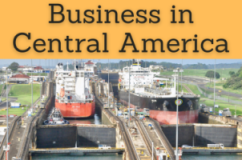
International Trade and Business in El Salvador

Salvadorian Trade Agreements and Market Access.
- El Salvador and the Latin American Economic Area
- Central American Integration System
- Central American Common Market (MCCA) - Integrated with the SICA -
- Association of Caribbean States
- Latin American and Caribbean Economic System
- Mesoamerica Project
- Taiwan-El Salvador Agreement
- El Salvador Free Trade Agreements (Central America): Chile, the EU, and Colombia
- El Salvador-Honduras-Taiwan Agreement
- Dominican Republic-Central America-U.S. Agreement
- Colombia-Northern Triangle Agreement
- Dominican Republic-Central America Agreement
- Mexico-Central America Agreement
- El Salvador-Ecuador Agreement
- Panama-El Salvador Agreement
- UK-Central America Free Trade and Economic Integration Agreement
- El Salvador-Cuba Partial Scope Agreement
- ALADI (observer)

- WTO
- GATS
- Agreement on Sanitary Measures
- Agreement on Technical Barriers to Trade
- Agreement on Preshipment Inspection
- Agreement on Safeguards
- Trade Facilitation Agreement
- WCO
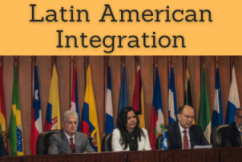
- Inter-American Development Bank
- OAS
- ECLAC
- CELAC
- FEALAC

- UN
- WB
- WTO
- IMF
- The Republic of El Salvador occupies an area of 21,041 km² in North of Central America
- Population of El Salvador: 6.3 million people, the highest population density in Latin America (Iberian America)
- The borders of El Salvador are Guatemala, Honduras, and Nicaragua
- Salvadoran Capital: San Salvador
- The official language of El Salvador is Spanish and Mayan languages
- El Salvador gained the independence from Spain in 1821
- Abolition of Slavery in El Salvador: 1824
The main religion in El Salvador is Christianity (6.7 million people).
- Catholics: 5.3 million people
El Salvador belongs to the Western Civilization - Latin American Economic Area.
Economy of El Salvador.
- El Salvador is situated in a strategic position in Central America, which gives it advantaged access to the largest Latin American and the v markets
- The main sectors contributing to the economic growth were agriculture and services (telecommunications, transportation, and banking)
- Salvadoran GDP: 22,114 million dollars
- The recent global economic crisis has led to slower growth of the Salvadoran economy, but the impact has been less than in other Central American Countries
- The Salvadoran currency is the U.S. Dollar (USD)
- Since 2001, the Republic of El Salvador is a dollarized Economy (absence of currency risk), the economy of El Salvador presented the lowest inflation and interest rate in Latin America (Iberian America)
- The Republic of El Salvador ranks as the fourth most transparent country in Latin America (Transparency International)
- The rating agency Moody has been giving “investment grade” to El Salvador since 1997
- The Macroeconomics stability in El Salvador allowed closing with a 4.7% economic growth rate of the GDP
- The inflation in El Salvador has decreased since the 90 until reaching a rate of 4.9%, the lowest rate at the regional level
- This is a result of the reforms that the Government of El Salvador implemented in 1989, with the goal of stabilizing an economy to attract the foreign direct investment: deregulation of fuels, fiscal reforms, international trade barriers elimination, public finances strengthening, financial system reforms, monetary integration policy, which stipulates that the U.S. dollar is the official currency of El Salvador since the law came into effect
- The aforementioned has led El Salvador to obtain the recognition from prestigious international entities that have distinguished El Salvador for its economic stability, ease of doing business, and competitiveness, among other aspects
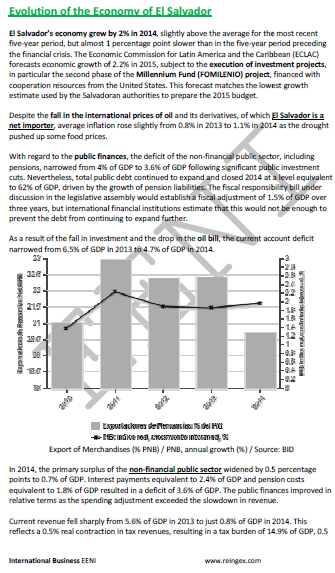
Global Trade and Business in El Salvador:
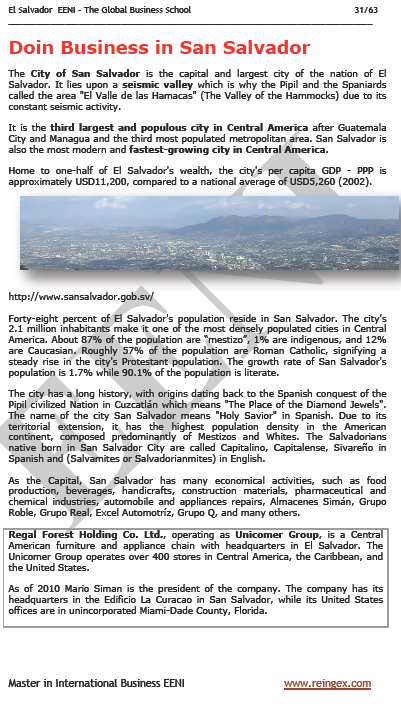
Salvadoran Companies.
- In 2001, after establishing an excellent business relationship with the Investment promotion Agency, the Spanish Calvo Group, with a presence in five continents, decided to install its largest tuna processing factory in El Salvador. The new plant, built on the Pacific coast of the department of La Unión, in the eastern zone of El Salvador, provides jobs to 3,000 employees
- Pettenati is one of the largest textile companies in Brazil. Pettenati started operations in El Salvador in November 2008 like easiness to reach the U.S. Market taking advantage of Trade Agreements
- SYKES is a global leader providing customer contact management solutions and services in business process outsourcing (BPO) arena. In 2001 the company research Latin America and the Caribbean looking for a destination to install the contact centre. They found many of these factors in El Salvador and started operations in 2003. SYKES El Salvador has 1,400 employees
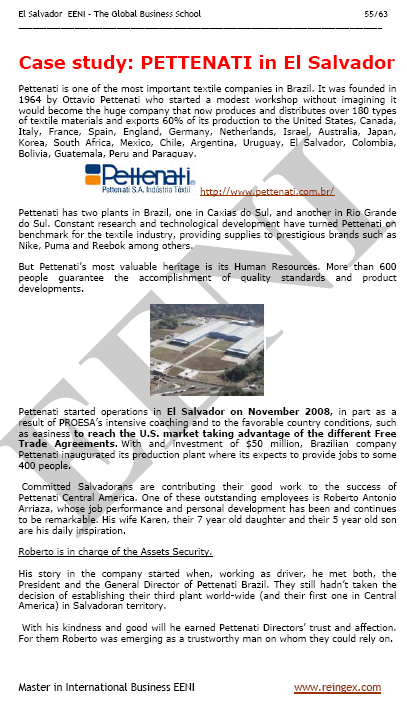

International Trade of El Salvador.
- The Foreign Trade of El Salvador experienced a severe recession in 2009 (global economic crisis) affecting the external demand
- Salvadoran imports: 7,254 million dollars
- The main export and import markets of El Salvador: foreign trade with the largest trading partners, which are the markets with which El Salvador has signed Free Trade Agreements and the Central American Common Market accounted for 90% of the Salvadoran exports and 70% of its imports
- The main Salvadoran export markets are Taiwan (86%), Mexico (17%) and the Dominican Republic (7%)
- Top twenty-five Salvadorans export products account for 54% of the total exports: textiles (26%), agribusiness (11%), food, and beverages (4%), machinery (3%), paper products and cardboard (3%) and chemical industries (2%)
- Among the top twenty-five imported products are mining, textiles, agribusiness, chemical, food and beverages, machinery, mechanical and electrical equipment, plastic, and rubber manufacturing
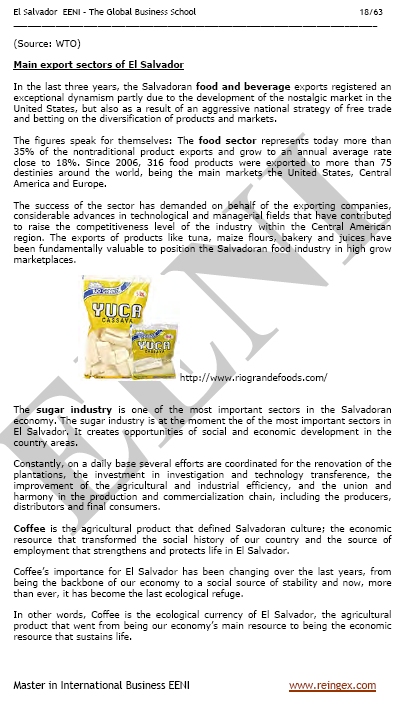
PROESA, the Investment Promotion Agency of El Salvador, is the Government agency responsible to promote the foreign direct investment in El Salvador.
(c) EENI Global Business School (1995-2024)
We do not use cookies
Top of this page


